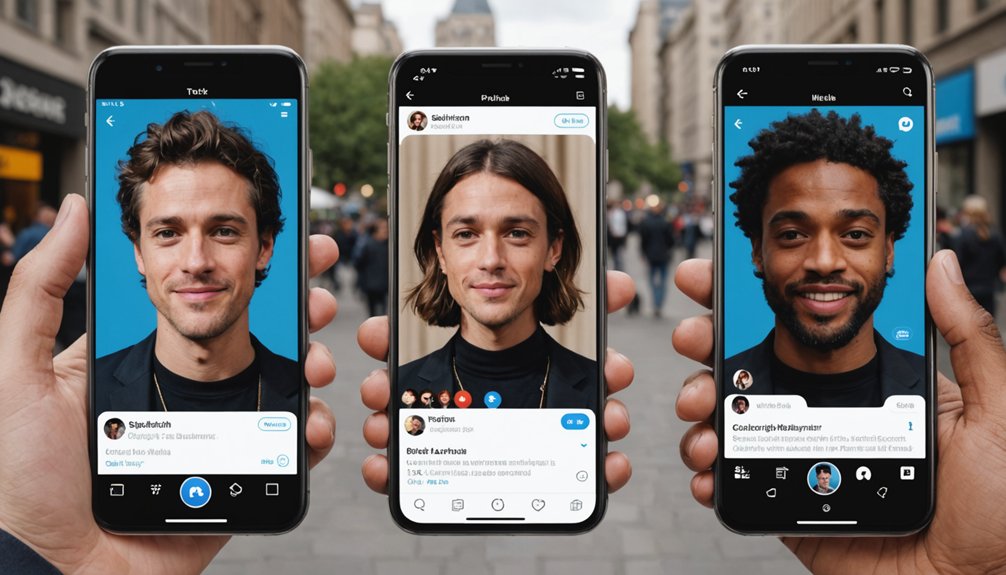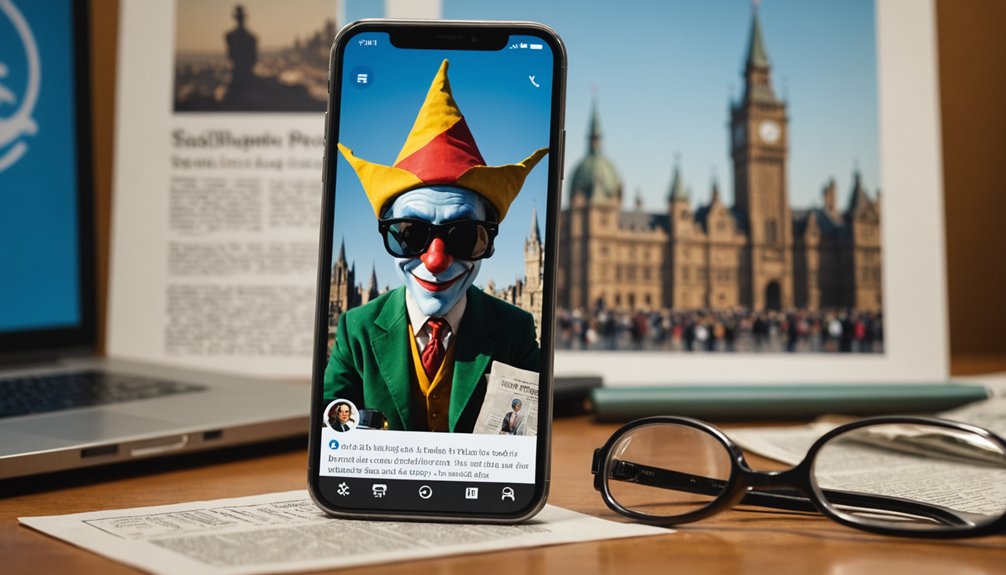Parody accounts on social media mimic real people, brands, or organizations with a comedic twist. They're digital court jesters wielding mockery through avatars and bios, aiming to satirize rather than deceive. Found mainly on Twitter and Instagram, these accounts must follow platform guidelines requiring clear labeling to avoid crossing into misinformation territory. Look for "parody" in the bio, check follower counts, and watch for over-the-top content. The best ones raise awareness through humor while keeping things obvious.

Mockery, wrapped in a profile picture and bio. That's fundamentally what a parody account is on social media platforms. These accounts imitate real people, brands, or organizations but with a comedic twist that's meant to entertain or critique. Unlike malicious fake accounts, parody accounts aim to satirize rather than deceive.
Parody accounts: digital court jesters wielding mockery through avatars, satirizing the powerful without malicious intent.
You'll find these comedic doppelgangers primarily on Twitter and Instagram. They mimic celebrities, politicians, companies—anyone recognizable enough to be lampooned. Think of them as digital court jesters, poking fun at the powerful through exaggerated posts and manufactured scenarios. Sometimes they're just for laughs. Other times, there's a sharper edge. Some users prefer platforms like decentralized Mastodon where community moderation helps maintain clearer boundaries between parody and deception.
The platforms themselves have rules about these joke accounts. Twitter demands clear labeling. X (formerly Twitter) has introduced specific parody labels. Bluesky has its own guidelines. The point? Don't trick people into thinking you're the real deal. That crosses a line from humor to deception.
But here's the problem. These accounts can accidentally—or intentionally—spread misinformation. The joke gets lost. The fake news spreads. Reality blurs. And suddenly, what was meant as satire becomes someone else's fact. Not so funny anymore. Modern text detection tools can help platforms identify and flag potentially misleading content.
Want to spot a parody account? Check the bio. Look for words like "parody," "fake," or "commentary." Compare follower counts—real accounts typically have more. Notice the tone. If it seems ridiculous or over-the-top, that's your first clue. The username often contains subtle variations from original accounts that can be easily overlooked by casual users. These accounts typically use their content to raise awareness about social issues through their humorous approach.
Social media is already a confusing information ecosystem. Parody accounts add another layer of complexity. They can make us laugh, sure. They can even provide valuable social criticism. But they can also confuse and mislead. The line between humor and misinformation is thinner than we'd like to admit.
In a world where information moves at lightning speed, knowing who's joking matters. A lot.
Frequently Asked Questions
Can Parody Accounts Get Verified on Social Media?
Parody accounts can get verified, but it's complicated.
Social media platforms have specific rules for them. Twitter requires clear "parody" labeling in both name and bio.
Verification badges aren't as reliable now – they can be purchased on some platforms.
X (formerly Twitter) is introducing special parody labels to help users spot fakes.
The verification landscape keeps changing.
Rules differ across platforms.
Nothing's simple anymore.
Are There Legal Consequences for Running Parody Accounts?
Yes, legal consequences exist. Properly labeled parody accounts generally enjoy fair use protections.
But cross the line? Trouble. Impersonation without clear disclaimers can lead to lawsuits, especially if there's damage to reputation or financial harm.
Platforms will suspend deceptive accounts faster than you can say "just kidding." Courts typically distinguish between harmless satire and malicious deception.
The key? Make it obvious you're not the real deal. No confusion, no problem.
How Do I Report a Harmful Parody Account?
Reporting harmful parody accounts varies by platform.
On Facebook, hit "Report" from the profile page.
Twitter users can fill out the impersonation form or flag it as "abusive."
Instagram? Tap those three dots, select "Report," then "Impersonation."
Snapchat requires searching "Report a safety issue" in Support.
Documentation matters.
Screenshot everything.
These accounts may seem funny, but they can spread dangerous misinformation.
Platforms take action when their policies are violated.
Do Parody Accounts Need Permission From the Subject?
Parody accounts legally don't need permission from their subjects. They're protected under free speech and fair use principles in many countries.
But there's a catch. They must be clearly labeled as "parody" in profile bios and names to avoid impersonation claims.
Cross that line? Legal trouble awaits.
Platforms have their own rules too. Twitter, X, and Bluesky all require explicit parody labels.
No disclaimer? Account could face suspension.
Can Businesses Benefit From Creating Parody Accounts?
Businesses can indeed leverage parody accounts as marketing tools. When executed properly, these accounts build brand awareness through humor and self-deprecation. They connect with younger audiences who appreciate irreverent content.
Not a risk-free strategy, though. Potential backlash looms if the satire isn't clearly labeled or goes too far. Some companies have successfully used parody to humanize their brand. Others crashed and burned. The line between clever and cringe is razor-thin.




